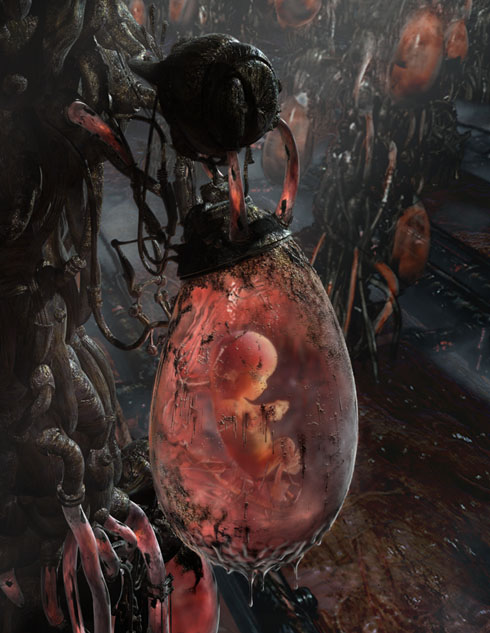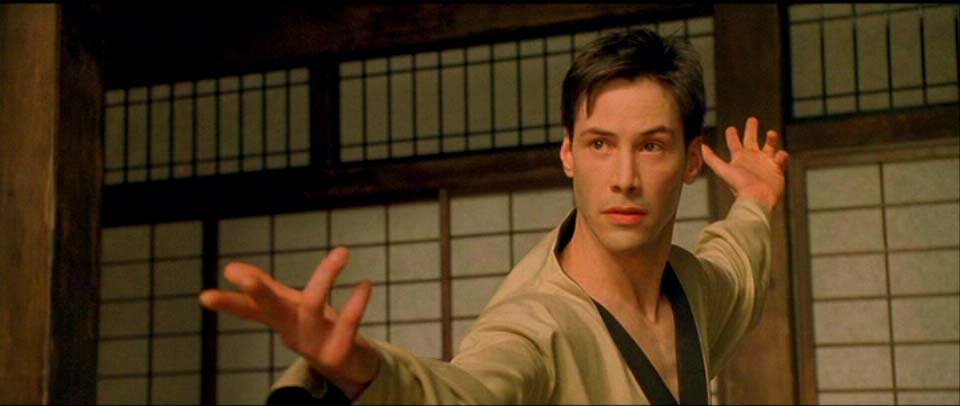
(Some of the comments below discuss scenes we didn't present to the class. Those comments are in this typeface.)
You ever have this feeling where you're not sure if you're awake or still dreaming?
Morpheus: Have you ever had a dream, Neo, that you were so sure was real? What if you were unable to wake from that dream? How would you know the difference between the dream world and the real world?
Neo: This can't...
Morpheus: Be what? Be real?
Neo: This isn't real...
Morpheus: What is "real"? How do you define "real"? If you're talking about what you can feel, what you can smell, what you can taste and see, then "real" is simply electrical signals intepreted by your brain...
[Turns on TV] This is the world that you know. The world as it was at the end of the 20th century. It exists now only as part of a neural interactive simulation that we call "The Matrix." You've been living in a dream world, Neo.
[TV switches to desolate world] This is the world as it exists today...
So one question the movie wants you to ask yourself is: How you know you're not in something like the Matrix program?
Here's another question to think about: How does Neo know that his experiences of "breaking out" of the Matrix program were real? Maybe they were just part of the program, too. How could he tell...?
A second issue that plays a large role in the film is the issue of fate. Some scenes in the movie where this is explicitly discussed:
Morpheus: Do you believe in fate, Neo?(Good argument, Neo.)
Neo: No.
Morpheus: Why not?
Neo: Because I don't like the idea that I'm not in control of my life.
Oracle: I'd ask you to sit down, but you're not going to, anyway... And don't worry about the vase.
Neo: What vase? [turns and breaks the vase]
Oracle: That vase.
Neo: I'm sorry.
Oracle: I said don't worry about it. I'll get one of my kids to fix it.
Neo: How did you know?
Oracle: Ohhh. What's really going to bake your noodle later on is, would you still have broken it if I hadn't said anything?
Agent Smith: Hear that, Mr Anderson? It is the sound of inevitability. It is the sound of your death...
(But then, whoops, Neo escapes.--Although he does get shot and "die" a few minutes later...)
The Matrix raises some other interesting philosophical issues, too.
 One issue we've already been thinking about is whether the machines and Agents have genuine mental lives of their own. The Agents are just computer programs; yet the movie presents them as if they really have thoughts and self-consciousness. For instance:
One issue we've already been thinking about is whether the machines and Agents have genuine mental lives of their own. The Agents are just computer programs; yet the movie presents them as if they really have thoughts and self-consciousness. For instance:
The movie takes up a form of this question when it asks how one knows what other creatures' experiences are like:
Mouse: Do you know what it really reminds me of? Tasty Wheat. Did you ever eat Tasty Wheat?
Switch: No, but technically neither did you.
Mouse: That's exactly my point. Exactly. Becuase you have to wonder now, now how do machines really know what Tasty Wheat tasted like. Maybe they got it wrong. Maybe what I think Tasty Wheat tasted like actually tasted like oatmeal or tuna fish. That makes you wonder about a lot of things...
The movie also raises some interesting questions about whether Agents have wills of their own.
Morpheus: I've seen an Agent punch through a concrete wall; men have emptied entire clips at them and hit nothing but air. Yet their strength and their speed are still based on a world that is built on rules. Because of that, they will never be as strong or as fast as you can be.
Neo: What are you trying to tell me? That I can dodge bullets?
Morpheus: No, Neo. I'm trying to tell you that when you're ready, you won't have to.
Do you think that's right? Do you think we have more free will than machines could ever have? Aren't our choices and desires just as determined by the laws of nature as their choices are determined by their programming?
 An issue we'll be taking up in our next classes is:
An issue we'll be taking up in our next classes is: